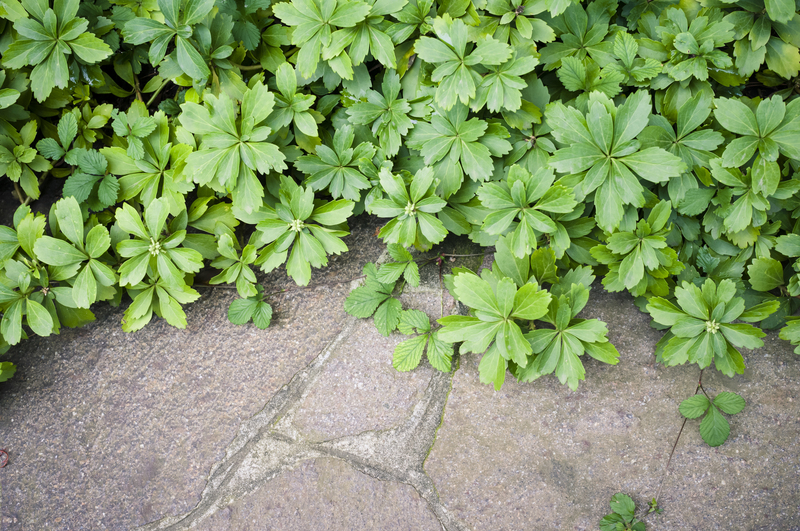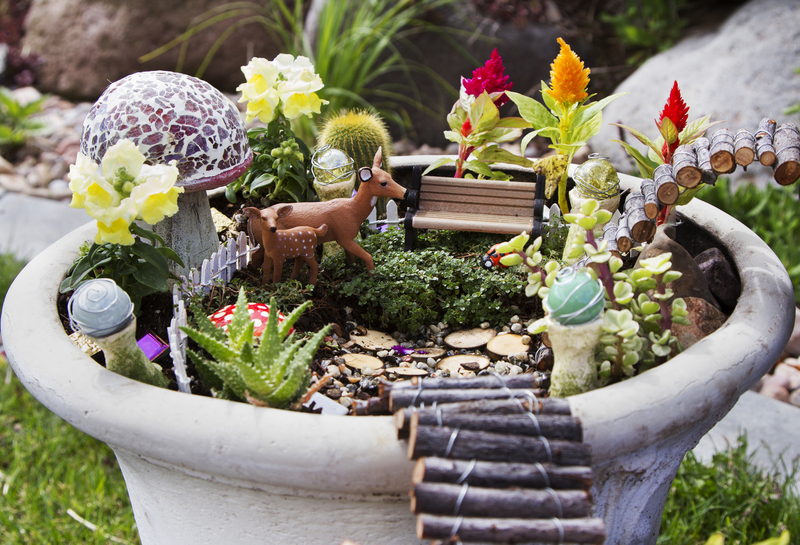Composting: Turning Trash into Treasured Soil
Posted on 30/08/2025
Composting: Turning Trash into Treasured Soil
Composting is an age-old practice that has gained modern appeal as we look for sustainable solutions to manage waste and enrich our soil. With increasing awareness of environmental challenges, more people are discovering the benefits of transforming everyday kitchen scraps and yard waste into nutrient-rich compost--a solution that truly turns trash into treasured soil. In this comprehensive guide, we'll explore the process of composting, its benefits, methods, and tips for success, equipping you with everything you need to start your composting journey today.

What Is Composting?
At its core, composting is the natural process of breaking down organic matter, like food scraps and leaves, into a rich, dark substance called humus. This process is driven by microorganisms, insects, and worms that decompose biodegradable waste, turning it into a valuable soil amendment. What might look like trash--uneaten fruits, vegetable peels, lawn clippings--becomes nourishing material for your garden, lawn, or houseplants.
Why Choose Composting?
- Eco-Friendly Waste Reduction: Composting redirects food scraps and yard trimmings from landfills, minimizing methane emissions and helping combat climate change.
- Soil Enrichment: Finished compost is a superior soil conditioner, boosting fertility and improving soil structure.
- Cost Savings: By creating your own fertilizer, you reduce the need for chemical products.
- Plant Health: Compost suppresses plant diseases, retains moisture, and promotes vigorous root growth.
- Community Impact: Composting can unite neighbors or schools around sustainability practices.
How Composting Works: The Science Behind the Process
Composting is a biological decomposition process, where organic materials such as leaves, food scraps, and grass clippings are broken down by microorganisms, earthworms, and fungi. These tiny workers require the right balance of carbon (brown materials) and nitrogen (green materials), moisture, and oxygen to convert waste into valuable compost.
The Four Key Ingredients in Composting
- Carbon (Browns): Dry leaves, straw, cardboard, or sawdust provide energy for bacteria and help aerate the pile.
- Nitrogen (Greens): Kitchen scraps, fresh grass clippings, coffee grounds, and manure offer the protein that microbes need to grow and multiply.
- Water: Moisture is essential, but the pile should feel like a wrung-out sponge--too much water can cause odor, too little slows decomposition.
- Air: Oxygen is vital. Regularly turning the pile keeps the process aerobic and odor-free.
The ideal composting ratio is about 2-3 parts brown to 1 part green. When combined, these materials heat up as microbes digest the scraps, resulting in a dark, crumbly, earthy-smelling product in as little as a few months.
Benefits of Composting: Why Should You Start?
The advantages of turning your trash into treasured soil extend far beyond the garden. Here are just a few compelling reasons to adopt organic waste recycling through composting:
1. Waste Diversion and Landfill Reduction
In the United States alone, food scraps and yard waste make up more than 28% of municipal solid waste. By composting this organic material, you prevent it from taking up valuable landfill space, where it would otherwise break down without oxygen and emit harmful methane, a potent greenhouse gas.
2. Healthy, Fertile Soil
Compost enriches soil by adding essential nutrients, increasing organic matter, and improving texture. This not only supports plant growth but makes soil more resilient, capable of holding water during droughts and draining excess during heavy rains.
3. Supports Biodiversity
The use of rich compost encourages beneficial organisms like earthworms and mycorrhizal fungi, which naturally help control pests and enhance plant health.
4. Reducing the Need for Chemical Fertilizers
By producing your own organic fertilizer, composting reduces reliance on synthetic products that can be costly and harmful to the environment.
Methods of Turning Trash into Soil Gold
There are several approaches to composting, each suited to different spaces, climates, and lifestyles. From backyard composting to small-scale indoor bins, here are the most popular composting methods:
Backyard Pile or Bin Composting
- Best for: Those with a garden or yard.
- Start by collecting your greens and browns. Build a pile or use a compost bin in a well-drained spot.
- Alternate layers of carbon-rich and nitrogen-rich materials.
- Keep the pile moist but not soggy; turn it every couple of weeks to aerate.
- After several months, the material at the bottom will turn into dark, crumbly compost.
Vermicomposting: Composting With Worms
- Best for: Small spaces, apartments, classrooms.
- Uses special worms (red wigglers) to break down food scraps in a bin.
- Worm bins are compact and can be kept indoors or in sheltered outdoor spots.
- Harvest worm castings (an excellent, mild fertilizer) every few months.
Bokashi: Fermenting Your Food Waste
- Best for: Urban dwellers, households with meat and dairy scraps.
- Uses a special inoculant of microorganisms to ferment (not rot) food waste in a sealed bucket.
- Quick process (2-4 weeks), minimal odor, and the finished product can be buried in the garden or added to an outdoor compost pile.
Tumbler Composting
- Best for: Beginners, families, or those with limited time.
- Container is mounted on a stand for easy turning and aeration.
- Speeds up the compost process, neat and pest-resistant.
What Can and Cannot Be Composted?
To ensure a successful composting process, it's important to know what can go into your compost pile and what should be left out. Here's a handy guide:
Compostable Items (Greens and Browns)
- Fruit and vegetable scraps
- Coffee grounds and filters
- Tea bags (remove staples)
- Eggshells
- Yard waste: grass clippings, leaves, twigs
- Shredded newspaper and cardboard
- Sawdust (from untreated wood)
Items to Avoid in Regular Composting
- Meat, fish, and dairy products (can attract pests and cause odors)
- Oily or fatty foods
- Bones
- Diseased plants or weeds with seeds
- Pet waste (may contain harmful pathogens)
- Coal or charcoal ash
Note: Some advanced methods like Bokashi can handle meat and dairy, but it's best to keep these items out of traditional compost piles.
Step-by-Step Guide to Starting Your Own Compost
Step 1: Choose Your Composting Method
Consider your available space, lifestyle, and types of waste you generate. For most backyards, a simple pile or bin is sufficient. For urban apartments, start with a worm bin or Bokashi bucket.
Step 2: Start Layering Materials
Begin with a layer of coarse twigs or straw at the bottom for drainage and air flow. Alternate layers of greens (kitchen scraps, grass clippings) and browns (dry leaves, cardboard).
Step 3: Maintain Proper Moisture
Your compost pile should feel like a wrung-out sponge. If it dries out, add water; if it's too wet, add more browns to absorb excess moisture.
Step 4: Turn the Pile
Aeration is key. Every 2-4 weeks, use a garden fork or shovel to mix and turn the pile. This helps speed up decomposition and prevents foul odors.
Step 5: Harvest the Compost
After 3-6 months (depending on conditions), your compost will look dark, crumbly, and have a fresh, earthy smell. Sift out any large pieces and use the finished compost to enrich your garden beds, flower pots, or lawn.
Common Composting Problems & Solutions
1. Compost Pile Smells Bad
- Cause: Too many greens (nitrogen-rich), piling on meat/dairy, or insufficient air.
- Solution: Add more browns, turn the pile, avoid adding prohibited items.
2. Compost Not Heating Up
- Cause: Small pile, lack of nitrogen, or too dry.
- Solution: Add more green materials and water, build a larger pile, insulate in cold weather.
3. Pile Attracts Pests
- Cause: Adding meat, dairy, or oily foods; compost left uncovered.
- Solution: Exclude problem foods, keep pile covered with leaves or use a closed bin.
Tips for Successful Composting
- Chop Materials: Cut up large waste items for faster decomposition.
- Balance Your Greens and Browns: Follow the ideal ratio for optimal composting speed.
- Location Matters: Place your compost bin in a convenient, well-drained, shaded spot.
- Patience: Composting takes time, but the final product is worth the wait.
Inspiring Ways to Use Finished Compost
Once your trash is transformed into valuable soil, the possibilities are endless for putting it to use. Here are a few creative applications:
- Amending Garden Beds: Mix compost into soil to boost vegetable, herb, and flower production.
- Lawn Top Dressing: Sprinkle a thin layer over the lawn to improve soil health and turf resilience.
- Potting Mix: Blend compost into houseplant or container garden soil for better drainage and nutrition.
- Treating Tree Roots: Apply compost around the roots of trees and shrubs as a mulch.
- Community Applications: Donate excess compost to school gardens, local parks, or urban farms.

Composting in Urban Areas: Overcoming Space Barriers
Not everyone has a backyard for conventional compost heaps, but urban composting is absolutely possible. With the rise of compact compost bins, worm farms, and community drop-off programs, city dwellers can participate in organic recycling and transform urban trash into treasured soil for rooftops, balconies, or local green spaces.
- Countertop Compost Bins: Collect daily food scraps, then drop off at community composting stations.
- Vermicomposting: Apartment-friendly worm bins handle food waste indoors without odors.
- Bokashi Buckets: Compact, airtight, and speedy--ideal for city kitchens.
- Community Compost Hubs: More cities support shared composting gardens where anyone can contribute and benefit.
Conclusion: Composting for a Greener Tomorrow
With the simple act of composting, we can all play a significant role in reducing landfill waste, improving soil health, and fighting climate change. By turning trash into treasured soil, we give back to the earth and close the loop in nature's cycle of renewal. Start today--whether you have a sprawling garden or a small kitchen--and discover how rewarding, easy, and empowering composting can be.
Ready to get started? Turn your organic waste into garden gold and become part of the movement transforming trash into the treasured soil of tomorrow.
- Embrace sustainability in your everyday habits.
- Nourish your soil and plants organically.
- Inspire your neighbors and community to compost, too.
Remember: Every banana peel, coffee ground, and pile of autumn leaves you compost makes a difference. Happy composting!
Latest Posts
Vertical Gardening for Beginners
How to Maintain a Flourishing Garden through Winter
Experience a Weed-Free Garden with 3 Strategic Tips
Creating an Exciting and Safe Garden Haven for Youngsters
Overgrown to Outstanding: Kicking Off Your Garden Renovation



